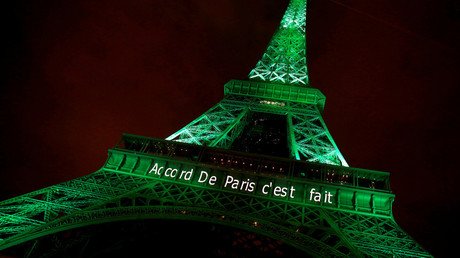Clock is ticking: Planet has only 12 years to avert global climate chaos, UN warns
The world’s nations should unite in an “unprecedented” effort to curb the global rise of temperatures by a larger-than-agreed margin, a UN climate-change panel said. This would limit the damage caused by industrialization.
The consequences of global climate change will be less severe for our planet if countries across the world managed to curb the rising of temperatures to 1.5 º C above pre-industrial levels, instead of the 2º C benchmark targeted today, the Intergovernmental Panel on Climate Change (IPCC) said on Monday. Reaching this objective is possible, the study noted, but will require revolutionary changes to power generation methods and the phasing out of fossil fuels, coal in particular. A major transformation will also be required to the transportation network, as well as to human lifestyles, especially when it comes to growing food.
The half-degree difference could stop the almost complete eradication of corals and would ease pressure on the Arctic, which is seeing a steady meltdown. Sea level rises would be 10 cm lower with a 1.5º C rise compared to 2º C by 2100. “Every extra bit of warming matters, especially since warming of 1.5ºC or higher increases the risk associated with long-lasting or irreversible changes, such as the loss of some ecosystems,” said Hans-Otto Pörtner, Co-Chair of IPCC Working Group II.
“Limiting global warming to 1.5°C compared with 2°C would reduce challenging impacts on ecosystems, human health and well-being, making it easier to achieve the United Nations Sustainable Development Goals,” Priyardarshi Shukla, Co-Chair of IPCC WG III #ipcc#sr15pic.twitter.com/z0nPfD7vdf
— IPCC (@IPCC_CH) October 8, 2018
Our top-level politicians should make tackling climate change their utmost priority before it's too late (Op-Ed by Ken Livingstone) https://t.co/1JQAkCE0FC
— RT (@RT_com) October 3, 2018
To achieve the desired goal, carbon dioxide emissions across the planet would need to fall by 45 percent from 2010 levels by 2030 and to reach “net zero” around 2050 to avoid catastrophic impacts, the scientists said.
The report, based on more than 6,000 scientific works, noted that consequences such as water scarcity, extreme weather, the spread of diseases and food shortages will be less severe at 1.5 º C rather than 2 ºC. If humanity passes the 1.5º C threshold, humans will need to rely on technologies to remove carbon from the atmosphere. However, “the effectiveness of such techniques is unproven at large scale and some may carry significant risks for sustainable development,” the report notes.
Build that wall: Climate scientists propose walling off Antarctic ice sheets to protect them
Monday’s report is a follow-up to the 2015 Paris Climate Change Agreement, under which 195 nations pledged to hold global temperatures “well below” 2º C above pre-industrial levels. Whether or not the goal is still attainable remains questionable after President Donald Trump pulled out of the agreement, claiming it was unfair to his country. So far the planet has witnessed a 1º C rise in temperature compared to pre-industrial levels. National commitments to cut emissions will not limit global warming to 1.5 º C, the report warns, stressing that 1.5 º C warming will be witnessed sometimes between 2030 and 2052 if the current trends continue.
If you like this story, share it with a friend!















